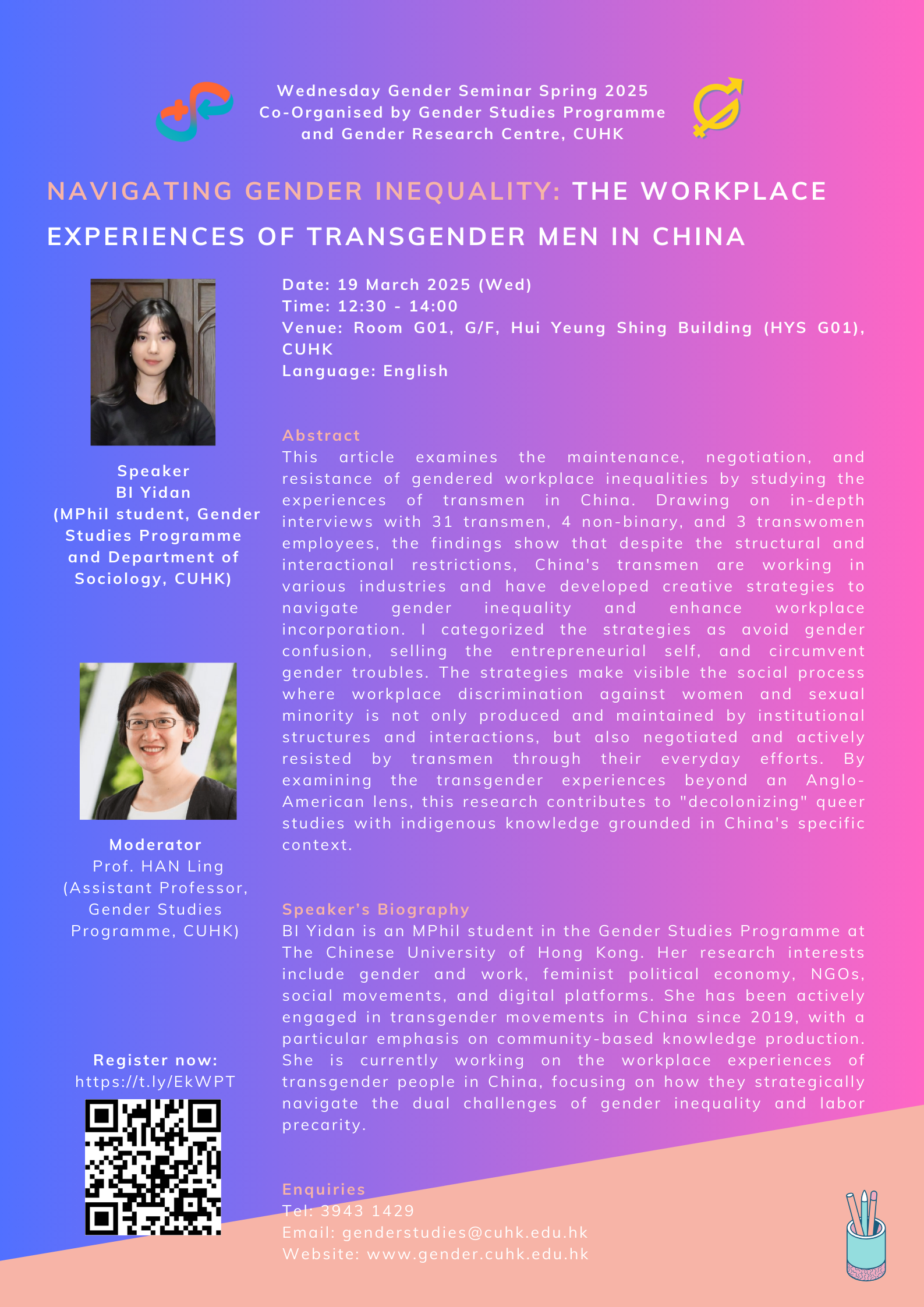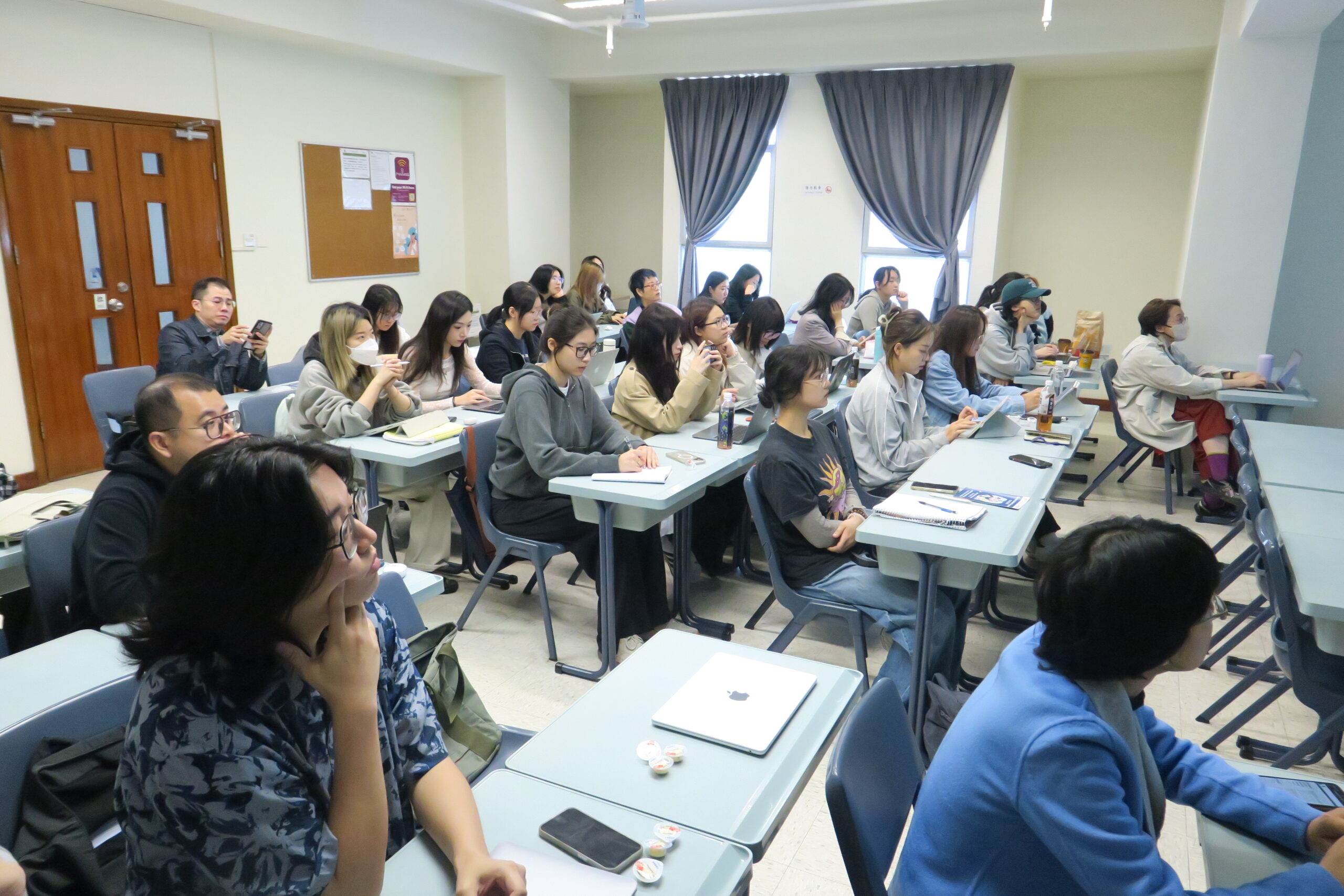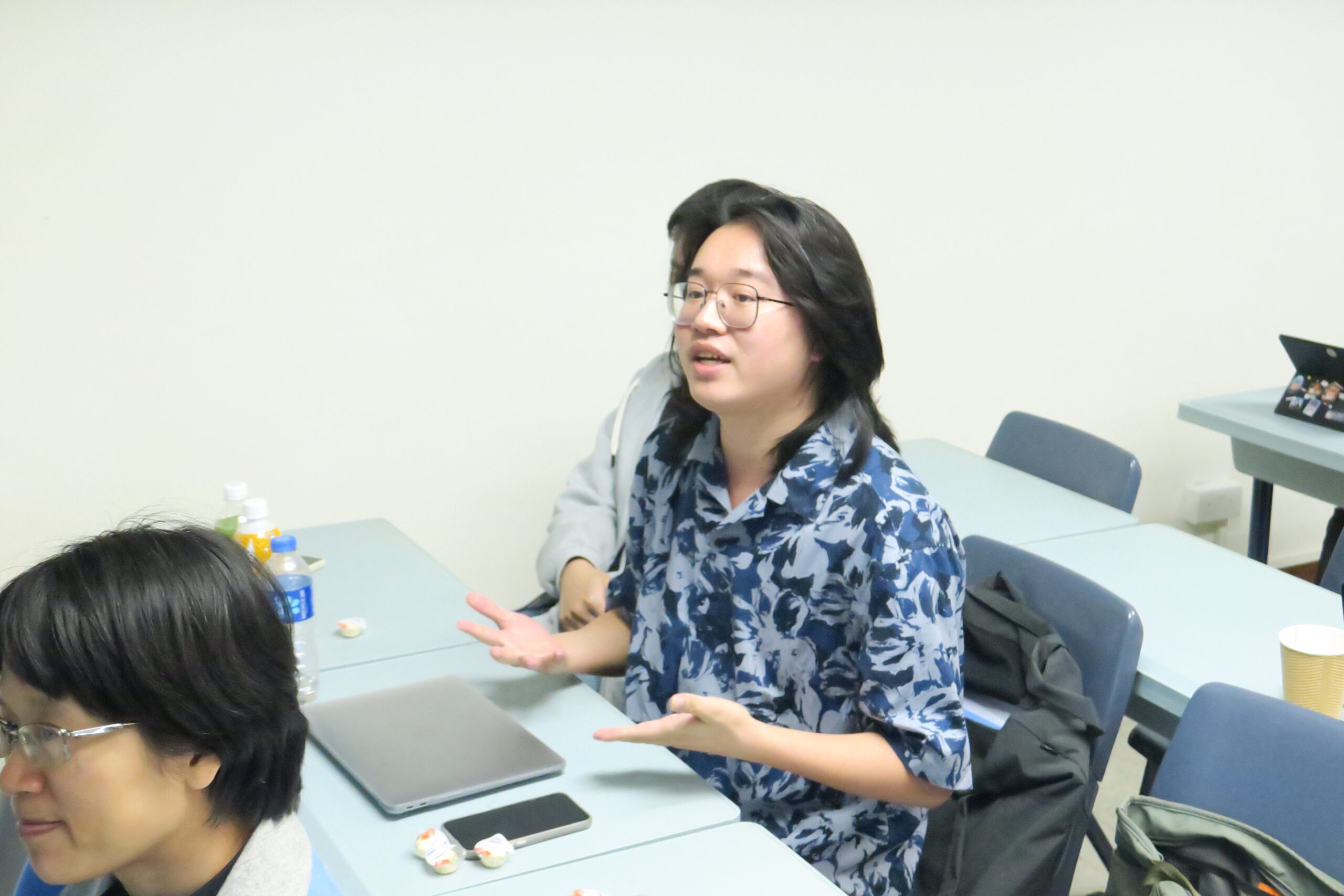Under Mainland China’s unique state governance framework, gender boundary regulation is institutionalized as a policy tool, for examples, exemplified by the National Radio and Television Administration’s ban on LGBTQ+ media representation and the Ministry of Education’s campaign against the “feminization of male adolescents.” These policies reinforce systemic discrimination against transgender rights legally and culturally. Simultaneously, neoliberal economic reforms—manifested in the gig economy and internet industries—ostensibly provide employment opportunities for transgender individuals, yet exacerbate inequality through precarious labor practices. This study examines the survival strategies and dynamics of gender inequality faced by transgender men in Chinese workplaces and aims to uncover how Chinese transgender men navigate the triple pressures of state regulation, traditional gender norms, and market logic, while analyzing how their strategies reflect mechanisms of inequality reproduction within China’s sociopolitical context.
Moving beyond traditional “doing gender” theory, this study adopts a “doing transgender” framework, positioning transgender individuals not as passive recipients of gender norms but as active agents negotiating and resisting through workplace interactions. Integrating queer value theory, it critiques neoliberalism’s commodification of transgender identities—such as aesthetic labor (appearance management) and emotional labor (client interactions)—that transform non-normativity into market value. Methodologically, the researcher conducted 38 in-depth interviews via engagement with Beijing-based transgender communities and analyzed 124 life narratives from transgender alternative media platforms, capturing diverse occupational experiences from high-skilled professionals to gig workers.
Transgender men in China confront dual institutional and interpersonal barriers: legal inconsistencies between gender markers on official documents (e.g., diplomas) force many to conceal their identities or minimize gender ambiguity, while workplace microaggressions—such as colleagues’ curiosity, gossip, or subtle exclusion—compound daily stress. To survive, they deploy three intertwined strategies. First, strategic “passing” through facial hair cultivation, voice training, and hypermasculine performances leverages patriarchal dividends for workplace advantage, yet demands self-erasure of traits incongruent with hegemonic masculinity (e.g., suppressing gentle personalities). Second, self-branding as “perfect transgender workers” reframes non-normative traits (e.g., “no maternity leave”) as market assets, as seen in one interviewee’s role as a pharmaceutical sales agent targeting transgender clients. While such narratives highlight agency, they individualize structural discrimination by framing success as a matter of personal competence. Third, guerrilla-style contingent employment—opting for gig work or digital nomadism—minimizes identity exposure through job-hopping, as exemplified by “Mr. Zhang,” who spent six years in transient roles requiring no ID checks. However, this precarity sacrifices job stability and social welfare. Critically, these survival tactics reproduce inequality: highly educated, “passing” elites gain limited space to challenge norms, while low-income workers remain trapped in cycles of marginalization.
The study reveals a distinctive collusion between state power and neoliberal markets in perpetuating gender inequality: the state enforces binary gender order through policies, while the market co-opts transgender labor under the guise of “inclusion,” weaponizing non-normativity for profit. This tension individualizes oppression—discrimination is misattributed to personal inadequacy rather than systemic failure. The research also critiques academic knowledge production: participants prioritized legal aid or employment support over theoretical contributions, exposing academia’s disconnection from grassroots needs. Furthermore, the urban, middle-class bias of the sample obscures rural and low-educated transgender experiences. The authors urge future research to incorporate workplace ethnography and translate findings into community empowerment.
For Chinese transgender men, workplace strategies are both survival tactics and micro-political battlegrounds for gender justice. While their individualized resistance demonstrates resilience, it inadvertently reproduces class and gender hierarchies. The study illuminates the entanglement of state surveillance, market logic, and patriarchal traditions in China’s modernization, offering a critical lens to understand queer labor experiences in Global South contexts. Ultimately, meaningful equality demands transcending individual adaptation, necessitating institutional transformation and collective solidarity.
Written by: NI, Cheng Shirley
This study explores the workplace experiences of transgender men in China, highlighting the complex interplay between state gender regulation and neoliberal labor market demands. Based on 38 in-depth interviews and analysis of 124 life stories from transgender media, the study reveals how transmen navigate systemic barriers such as legal inconsistencies in gender markers, limited access to gender-affirming healthcare, and workplace discrimination often disguised as efforts to “maintain harmony”. Despite these challenges, transmen employ diverse strategies to secure employment, including avoiding gender confusion by passing as male, branding themselves as “cost-effective” labor to align with neoliberal expectations, and opting for gig economy jobs to minimize disclosure risks – though often at the cost of stability and benefits. The research underscores how China’s unique context – where state policies, Confucian legacies, and digital feminism shape gender norms – diverges from Western-centric narratives that assume transgender individuals either “go stealth” or openly resist. Instead, transmen in China tactically negotiate visibility, leveraging community solidarity and reframing their identities to fit cisnormative understandings while subtly expanding gender boundaries. However, these strategies reproduce hierarchies within the trans community, privileging those with education, passing privilege, or economic capital. The study critiques the neoliberal shift of structural burdens onto individuals, where success is framed as dependent on personal resilience rather than institutional change. It also reflects on tensions between academic knowledge production and participants’ desires for tangible support, calling for research that centers indigenous resistance and bridges theory with actionable outcomes for marginalized communities. By situating trans labor within China’s authoritarian neoliberalism, this work contributes to global debates on gender, work, and inequality, challenging universalized notions of queer liberation.
Written by: DUAN, Yawei Gloria
本次講座的主題是中國跨性別男性在工作場合中的經歷及其應對策略,主講人Yidan BI分析了跨性別男性如何在職場中應對身份資訊不匹配帶來的制度性障礙和社會歧視,以及他們在新自由主義經濟和國家性別監管雙重影響下的生存策略。
她以“做性別”、酷兒價值與新自由主義經濟作為理論框架,提出了以下幾個研究問題:跨性別男性在中國職場的多樣化經歷是怎樣的?跨性別男性在職場中採用了哪些策略來融入或適應?這些經歷和策略如何反映中國語境下的性別不平等動態?基於此,她2019年起進入北京跨性別社群進行田野調查,共對38名跨性別男性進行了深度訪談,並對124篇線上生活故事進行了內容分析。
從求職經歷的角度來說,許多跨性別男性回避填寫性別,或標注為男性以提高面試成功率。而在進入面試時,“不問不說”策略較普遍。在職場互動方面,外企、藝術行業公司有較包容的性別友好政策,在大部分公司中隱性、微妙排斥較常見。部分跨性別男性獲得“男性紅利”,但也不適應職場對男性的刻板期待。應對策略則可以被分成三種:①避免性別困惑,通過解釋為其它更容易被理解的身份認同減少HR的質疑,或利用外貌和聲音“通過”為男性。②個人品牌化,通過提升專業技能、塑造可靠形象來增加職場競爭力,甚至將跨性別身份作為市場優勢。③遊擊式就業,選擇零工經濟或短期工作,以規避長期雇傭關係中的性別審核風險,減少身份暴露帶來的職場障礙。總的來說,本研究揭示了中國跨性別男性在職場中的困境,並探討了他們如何通過不同策略來適應或挑戰既有性別規範。
Written by: CHEN, Yuxiang
中國跨性別男性在職場中面臨著許多不平等,這也為研究者提供了多樣化的研究視角。香港中文大學性別研究專業的畢一丹通過深入的訪談和內容分析,探討了跨性別男性在中國職場中的處境、應對策略以及這些經歷是如何反映中國背景下的性別不平等動態。
與西方不同的是,中國跨性別者很難“隱身”於社會,因為中國的性別規範受到國家治理策略的影響,同時中國蓬勃發展的新自由主義經濟,尤其是零工經濟和互聯網巨頭為跨性別者提供了新的就業機會。在這種背景下,跨性別男性在職場中的機會和限制是並存的,因此,就需要他們具備更多的應對策略以及差異化優勢。
畢一丹學姐發現,跨性別男性在多種行業找到了工作,但在求職過程以及職場互動中還是不免會遇到微妙排斥或者明確歧視的情況。求職過程中,跨性別男性通常避免在簡歷中提及性別,或者在面試中直接公開自己的性別身份。在外資公司或有反歧視政策的公司中,他們更有可能獲得工作機會。同時,在職場中同事的態度也可能天差地別,他們可能會面對直接的支援或是友好但不理解,也有可能會引來他人的好奇與八卦、微妙的排斥或是明確的歧視。因此,建立公司內部的反歧視系統和正式的反歧視法對於應對歧視十分重要。
跨性別男性在職場中努力的應對性別不平等的挑戰,他們試圖通過避免性別混淆、塑造完美的跨性別工人形象、遊擊式就業等應對策略來尋求一個相對更加安全的空間和形象來工作。
由於研究可能存在選擇偏差,無法接觸那些對研究不感興趣的人,所以研究者也建議未來的研究更多地關注社區知識的生產。總之,研究揭示了全球化和新自由主義市場為中國跨性別男性創造的新的就業機會,但傳統性別規範和新自由主義共同定義了什麼樣的跨性別工人是“好”的。因而跨性別男性在職場中面臨著性別二元制的挑戰,以及將結構性問題轉移給個人的負擔。儘管如此,跨性別社區內部的團結和對外的適應策略為他們提供了應對性別不平等的手段。
Written by: ZHAO, Enzexi










A
A
A
聯絡我們